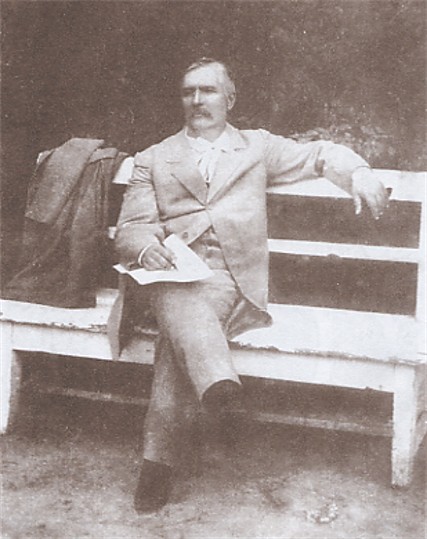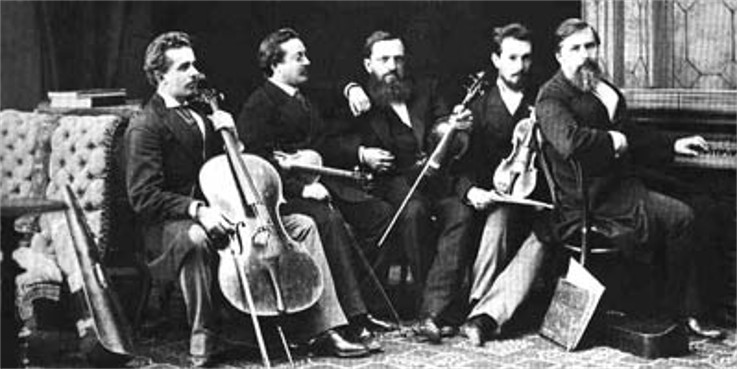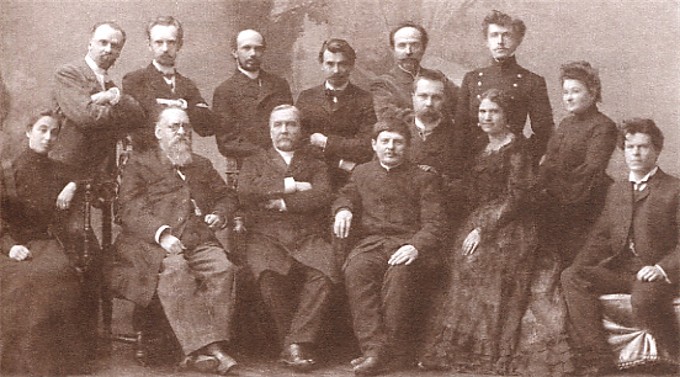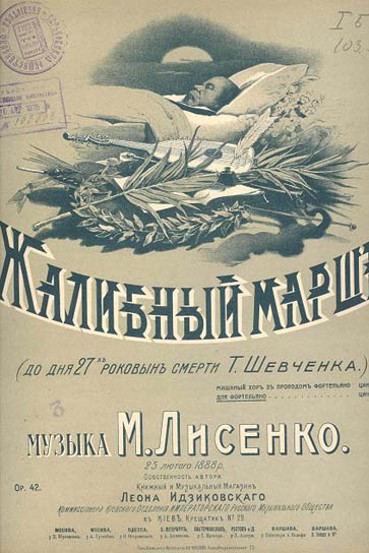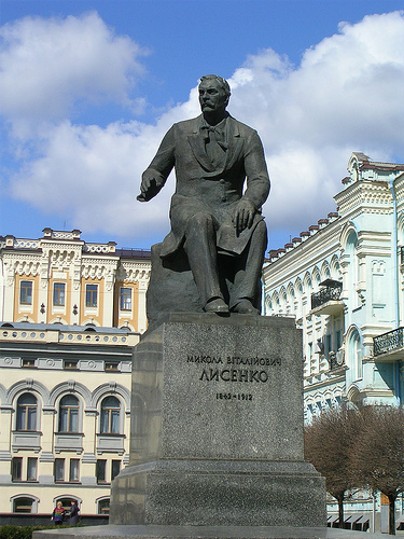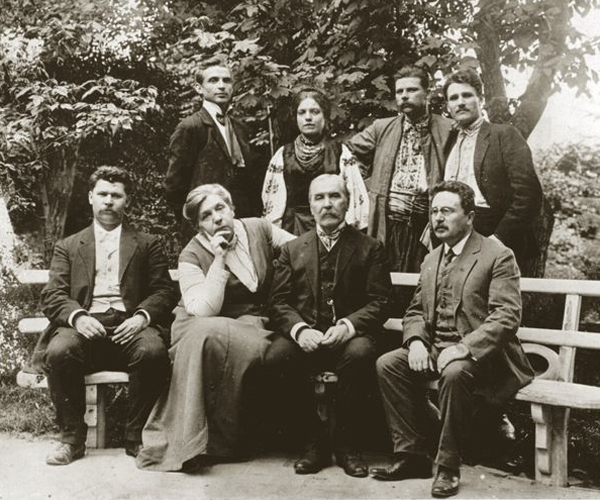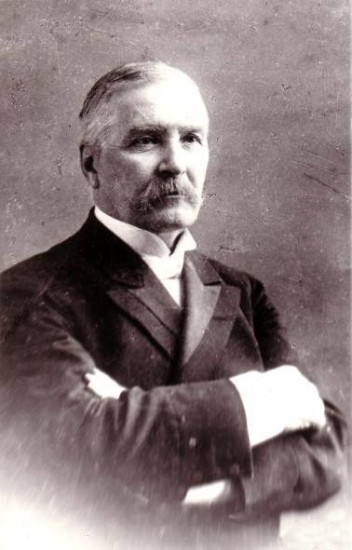Lysenko, Mykola
Lysenko, Mykola [Лисенко, Микола], b 22 March 1842 in Hrynky, Kremenchuk county, Poltava gubernia, d 6 November 1912 in Kyiv. Composer, ethnomusicologist, conductor, pianist, teacher, and community figure. The descendant of an aristocratic Cossack starshyna family (see Lysenko family), he acquired the rudiments of piano playing from his mother and gained a strong appreciation of Ukrainian music and Cossack lore from his grandparents. From 1860 he studied at Kharkiv University and Kyiv University, graduating in 1865 with a degree in natural sciences. His stay in Kyiv, his activities in the Hromada of Kyiv, and his close relationships with his cousin Mykhailo Starytsky, and with Volodymyr Antonovych, Tadei Rylsky, and others led Lysenko to make a strong personal commitment to the study and development of Ukrainian music. He worked for two years as an arbitrator in Tarashcha county, then furthered his music studies in Leipzig (1867–9) under K. Reinecke and E. Richter. After returning to Kyiv in 1869 to work as a music teacher and conductor, he moved to Saint Petersburg (1874–6) to study orchestration under Nikolai Rimsky-Korsakov; then he returned to Kyiv, where he gave music lessons for many years (notably at the local Institute for Daughters of the Nobility) before opening his own school of music and drama (see Lysenko Music and Drama School) in 1904.
At the time, Lysenko was at the center of Ukrainian cultural and musical life in Kyiv. He gave piano recitals and organized choirs for performances in Kyiv and tours through Ukraine in 1893, 1897, 1899, and 1902. He cultivated an informal network of patriotic Ukrainians, and headed the Ukrainian Club from 1908. He also maintained close ties with community leaders in Western Ukraine from as early as 1867, most notably with Ivan Franko.
Lysenko's musical compositions were numerous and varied. His operatic works include the singspiel Chornomortsi (Black Sea Cossacks, 1872); the operetta Natalka from Poltava (1889); the operas (based on works by Nikolai Gogol) Christmas Night (1873–82), Utoplena (The Drowned Maiden, 1883), and Taras Bulba (1890); the operetta Aeneid (1911); the miniature opera Nocturne; and three children's operas: Koza Dereza (Billy Goat's Bluff, 1888), Pan Kots’kyi (Sir Catsky, 1891), and Winter and Spring (1892). Other theatrical musical works include Sappho (1886–94), which is composed of scenes from life in ancient Greece, and music for William Shakespeare's Hamlet.
An eminent concert pianist, Lysenko wrote many compositions for the piano. These works include a sonata, two rhapsodies, a suite, a scherzo, and a rondo, as well as a long list of smaller forms such as ‘Songs without Words,’ nocturnes, waltzes, and polonaises. In these works he often uses the melodies and rhythms of Ukrainian folk songs. In some, Fryderyk Chopin's influence is noticeable. In the field of chamber music, Lysenko wrote many works for violin and piano as well as a trio for two violins and viola and a string quartet. He also wrote a symphony (unfinished) and a symphonic fantasia.
Settings of words by Taras Shevchenko occupy a special place in Lysenko's works. The settings include solo art songs, choral works, and cantatas for choir and orchestra, such as Raduisia nyvo nepolytaia (Rejoice, Unwatered Field), Biut’ porohy (The Rapids Roar), Reve ta stohne Dnipr shyrokyi (The Mighty Dnieper Roars and Bellows), Sadok vyshnevyi kolo khaty (The Cherry Orchard by the House), and Na vichnu pamiat’ Kotliarevs’komu (To the Eternal Memory of Kotliarevsky). Shevchenko's collection Kobzar particularly fascinated Lysenko, who composed music for 82 of its texts.
In total Lysenko wrote over 120 art songs, including many vocal solos with piano accompaniment to the poems of Ivan Franko, Lesia Ukrainka, Oleksander Oles, Heinrich Heine, Adam Mickiewicz, and others. A six-CD compilation of these was released in Canada in 2010 by the Ukrainian Art Song Project.
From an early age Lysenko displayed an interest in musical folklore. While still in school he began transcribing Ukrainian folk songs, and when working in Tarashcha county he recorded the wedding songs of the Pereiaslav region and the dumas and historical songs performed by the renowned kobzar Ostap Veresai. Lysenko's ethnomusicological works include Kharakterystyka muzychnykh pytomennostei ukraïns’kykh dum i pisen’, vykonuvanykh kobzarem O. Veresaiem (Characterization of the Musical Traits of Ukrainian Dumas and Songs as performed by the Kobzar O. Veresai, 1874; repr in 1955) and a monograph about Ukrainian folk musical instruments: Narodni muzychni instrumenty na Ukraïni (Folk Musical Instruments in Ukraine, 1894; repr in 1955). He also published several collections of folk songs.
Over his lifetime Lysenko arranged approximately 500 folk songs, including both solos and choruses with piano accompaniment, and a cappella choruses. He concentrated on tonal and harmonic particularities of Ukrainian folk songs, selecting appropriate means for the arrangement of various types of songs and preserving the folk style of melodizing.
Lysenko was the founder of the national movement in Ukrainian music, based on a specific Ukrainian cultural tradition and the originality of its folk music. His prolific and versatile life's work became the foundation for the further development and expansion of Ukrainian musical culture. Lysenko influenced a large group of Ukrainian composers, including Kyrylo Stetsenko, Mykola Leontovych, Yakiv Stepovy, Oleksander Koshyts, Stanyslav Liudkevych, Lev Revutsky, and Mykhailo Verykivsky.
A compilation of Lysenko's works was published in 20 volumes in Kyiv in 1950–9. A bibliographic essay on Lysenko by Roman Savytsky Jr. appeared in 1992 under separate cover as Mykola Lysenko in Western Sources and in a Ukrainian version in ZNTSh CCXXVL, Pratsi Muzykoznavchoï Komisiï (1993); an extensive Lysenko bibliography, compiled by I. Nehreichuk et al, appeared in 2009. A guide to Lysenko’s published scores, compiled by O. Osadtsa and edited by S. Kostiuk, was published in Lviv in 2001. A collection of his correspondence, compiled by Roksana Skorulska and edited by Anatolii Lashchenko et al, was published in 2004. Vasyl Shevchuk’s Strasti za Mykolaiem (The Passion According to Mykola, 2007) provides a fictionalized account of Lysenko’s life.
BIBLIOGRAPHY
Zbirnyk Muzeiu diiachiv nauky ta mystetstva Ukraïny (Kyiv 1930)
Lysenko, O. M.V. Lysenko: Spohady syna (Kyiv 1959, 1966)
Rudnyts’kyi, A. Ukraïns’ka muzyka (Munich 1963)
Zahaikevych, M. (ed). Mykola Lysenko: Borets’ za narodnist’ i realizm u mystetstvi (Kyiv 1965)
Lysenko, O. (ed). M.V. Lysenko u spohadakh suchasnykiv (Kyiv 1968)
Vasylenko, Z. Fol’klorystychna diial’nist’ M.V. Lysenka (Kyiv 1972)
Bulat, T. M. Lysenko (Kyiv 1973)
Arkhimovych, Lidiia; Hordiichuk, M. Mykola Vitaliiovych Lysenko: Zhyttia i tvorchist’, 3rd rev ed (Kyiv 1992)
Filenko, Taras; Bulat, Tamara. The World of Mykola Lysenko: Ethnic Identity, Music, and Politics in Nineteenth and Early Twentieth Century Ukraine (Edmonton 2001)
Iakubliak, Ia. Mykola Lysenko i Stanislav Liudkevych (Lviv 2003)
Lashchenko, Anatolii et al (eds). Mykola Lysenko u spohadakh suchasnykiv, 2 vols (Kyiv 2003)
Revuts’kyi, Dmytro. Mykola Lysenko: Povernennia pershodzherel (Kyiv 2003)
Shevchuk, Oksana (ed). Mykola Lysenko ta ukraïns’ka kompozytors’ka shkola (Kyiv 2004)
Wasyl Wytwycky
[This article was updated in 2010.]

.jpg)
.jpg)
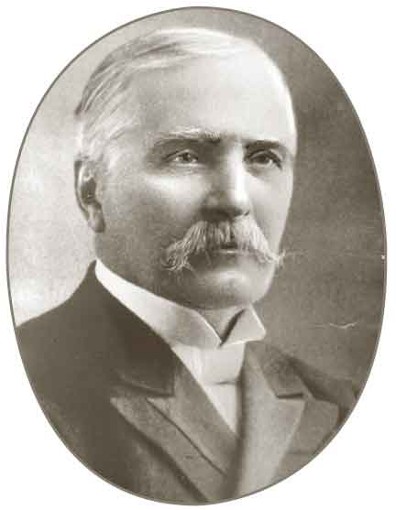
.jpg)
